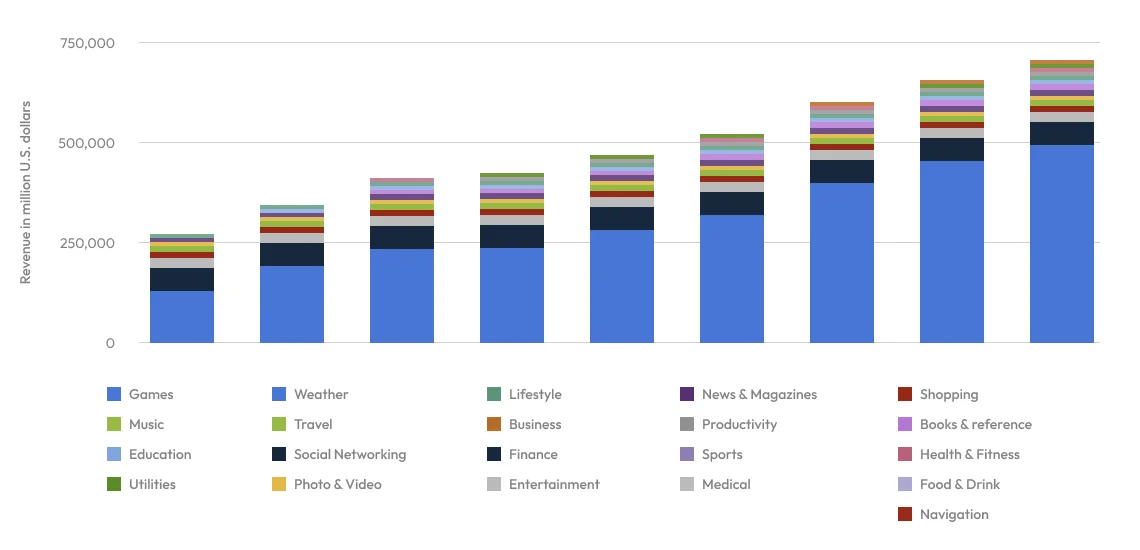Technology
The Role of Mobile Apps in Advancing Digital Transformation

Mobile apps empower businesses’ digital transformation initiatives by providing them with the technology-driven tools they need to innovate, engage customers, streamline operations, and drive growth in today’s digital age. This blog post will provide you with more insights into how mobile apps become lucrative in driving the digital transformation of a business and the benefits the business can avail from it.
Recently, most businesses have embarked on an advent to reinvent themselves digitally, aiming to translate their technical decisions into tangible business value and ROI. This shift goes beyond merely adopting technology; instead, it emphasizes the importance of sustainable growth.
It does not have to be a big dramatic start to this journey, such as an entire technological makeover, but rather small efforts like investing in mobile app development.
The following numbers speak volumes when it comes to statistics garnering attention on how mobile apps are lucrative for digital transformation:
- A staggering 78% of consumers utilize mobile devices to connect with brands for customer service.
- According to a report by Statista, by 2027, global spending on digital transformation is forecasted to reach a staggering 3.9 trillion U.S. dollars.
Before we delve into understanding how mobile apps will be the catalyst for your digital transformation, let us first explore the aftermath of having a highly effective mobile app for your business.
Why Should Businesses Consider Mobile Apps for Digital Transformation?
In this mobile-first era, where not only the customers benefit from these apps, but businesses can also utilize them from an operational standpoint to transform digitally. Here are some of the reasons why businesses should consider investing in a mobile app to kick-start their digital transformation journey:
Elevated customer engagement
Mobile apps are more than just the availability of services at the customer’s fingertips. From personalized recommendations to notifications, reminders, AI-powered chatbots, and more, these apps enable businesses to customize their offerings to ensure personalized customer experience.
CXOs can now utilize mobile app-driven digital transformation to deliver unparalleled customer satisfaction and loyalty, ultimately driving long-term business growth and success.
Increased sales
The most tangible outcomes can be seen when mobile apps are used in the retail industry. Mobile apps allow for personalized shopping experiences through features such as tailored recommendations, loyalty programs, and in-app promotions, which can enhance customer satisfaction and drive repeat purchases.
Additionally, mobile apps enable seamless transactions, reducing friction in the purchasing process and encouraging impulse buying behavior.
Improved employee productivity
Having a mobile app for the business to automate repetitive tasks, streamline workflows, and integrate seamlessly with your existing systems and processes means employees spend less time doing manual work.
Furthermore, there is real-time communication and collaboration among team members, regardless of their location. Mobile apps feature built-in task management tools that allow employees to organize their workload, set priorities, and track progress on various projects.
Enhanced operational efficiency
Let’s consider a use case in the healthcare industry, where the adoption of mobile apps has revolutionized patient care and medical practices. With a custom mobile app, healthcare providers can streamline appointment scheduling, patient communication, and access to medical records.
For instance, doctors can use mobile apps to quickly access patient data, review test results, and prescribe medications, all from their mobile devices. This seamless access to information enables healthcare professionals to make faster, more informed decisions, leading to improved patient outcomes and operational efficiency.
We collaborated with Sully.ai, which not only enables digital information but also integrates AI to take it to the next level by offering support with clinical decision-making to increase diagnosis accuracy and optimize treatment planning.
Competitive edge
In a nutshell, having a mobile app is not just about keeping up with the latest trends; it’s about seizing opportunities to transform your business and gain a competitive edge in the market.
With a well-designed and strategically implemented mobile app, you can elevate the customer experience, boost engagement, streamline operations, and differentiate your brand in a crowded marketplace.
Security and compliance
With a mobile app tailored to your business, you can implement robust security measures such as encryption, multi-factor authentication, and secure data transmission protocols. These features ensure that sensitive financial information remains protected, safeguarding your client’s privacy.
Regulatory compliance is a top priority for businesses across industries, especially in sectors like healthcare, finance, and e-commerce. Our mobile apps are designed with compliance in mind, ensuring adherence to industry-specific regulations such as HIPAA, GDPR, or PCI DSS.
| 💡 Now that you understand the importance of having a mobile app for your business, and on a broader scale, the significance of digital transformation, it leads us to the next step in the process – having a team that can implement digital transformation. Partnering with a company offering digital transformation services is the best way forward. This way, you will have a team like ours, experienced and expert at implementing digital transformation strategies for businesses belonging to various industries. The only task left for you will be to find the right digital transformation partner. |
Role of Mobile Apps in Digital Transformation
Digital transformation is a comprehensive process, with mobile apps being one of its stepping stones for businesses regardless of their industry.
Here’s how mobile apps become instrumental in digital transformation:
Serves as your businesses’ digital storefront
Mobile apps offering your services or products give customers and prospects the firsthand experience of what your brand feels like and the unique value proposition. It provides convenience to the users, reinforces brand awareness, delivers personalized experiences, overcomes geographical barriers, drives engagement, and all of this eventually generates revenue for your business.
The below graph by Statista shows the revenue generated by mobile apps from various industries.


AI/ML-powered Mobile Apps
Just as a smart assistant on your phone starts anticipating your routine based on the choices you make, such as ordering coffee every morning, it would start suggesting the same around the same time. Using AI and ML for digital transformation can do the same for businesses. These apps are powered by machine learning algorithms, natural language processing, deep learning techniques, and more to deliver intelligent, personalized, and context-aware experiences to users across industries.
For instance:
- For a retail company, this mobile app can analyze your past purchases, browsing history, and preferences to recommend products that you’re likely to be interested in, increasing the chances of you making a purchase.
- When it comes to AI/ML in healthcare, these mobile apps can analyze vast datasets of genomic information, patient health records, and clinical data to develop personalized treatment plans tailored to individual patients, known as precision medicine.
And so on for other industries like logistics, finance, and more.


Automation
Having a mobile app simply means streamlining processes through the automation of tasks that were previously manual.
Let’s consider how it can benefit your sales team. Managing customer relations can be a daunting task, especially when done manually, resulting in missed follow-ups, limited visibility into sales performance, insufficient coordination, and more.
However, with a customer relationship management (CRM) app for your enterprise, many tasks can be automated. This includes logging interactions with clients, scheduling follow-up tasks, lead qualification, generating reports, and offering tailored marketing messages, offers, and services to individual customers.
Apart from CRM apps, apps like inventory management apps, accounting and invoicing apps, human resource management apps, project management apps, workflow automation apps, and more can be used by businesses, covering various aspects of operations and management.
Internet of Things (IoT) Integration
We are well aware of the power of controlling various aspects of your home from your smartphone, thanks to IoT sensors. These mobile apps can also be used by businesses to transform operations for both B2B and B2C businesses.
If you are a B2C business with a retail store, opting for IoT-integrated mobile app development would enable you to implement smart shelves equipped with sensors. With this technology, you can enhance real-time inventory tracking. The mobile app features prompt notifications to the store manager’s phone when product quantities on any shelves are running low. Furthermore, large retail stores can integrate indoor positioning systems (IPS) or iBeacon technology to provide in-store navigation assistance through the app.
On the other hand, if you are a B2B business—a manufacturing company producing machinery—the IoT-integrated mobile app will provide insights into real-time data on machine performance. You can also make sure that the maintenance technicians receive predictive maintenance alerts and recommendations for preventive actions to take, such as replacing worn-out parts scheduling maintenance tasks during off-peak hours, and so on.
Scalability with Cloud Computing
When businesses grow, the team often struggles to keep track of everything. Gradually, collaboration among various departments decreases, accessibility diminishes, performance declines, and the system becomes incapable of accommodating growth in all business aspects, whether it be workflows, user base, operations, and more. Cloud-enabled mobile apps are the best way forward!
Here’s how cloud technology enables businesses’ digital transformation:
- Instant access to important data and services from anywhere, at any time.
- Allows businesses to scale resources up or down based on demand.
- Significantly reduces infrastructure costs associated with hosting and maintaining their mobile apps.
- Eliminates the need for upfront hardware investments, allowing businesses to pay only for the resources they use.
- Businesses can benefit from advanced security features, such as encryption, access controls, and regular security audits, ensuring the confidentiality, integrity, and availability of their data.
Our team collaborated with Nutritsar – a fitness supplement retail shop to integrate cloud technology, enabling them to be future-ready for the growth of their user base. We utilized cloud-based hosting platforms to facilitate real-time updates and accessibility, empowering their team to manage inventory and promotional activities effortlessly.
Integration with Existing Systems
The cherry on top of having a mobile app is being able to integrate all the existing systems that used to be isolated from each other before with the mobile app, whether it’s the CRM software, your inventory management system, your accounting software, and so on.
This enables your team real-time access to everything in the mobile app, which is accessible to all employees. Additionally, all of this data would seamlessly sync back to your existing systems, keeping everything up-to-date and in sync.
Data-backed Decisions
Mobile apps collect a significant volume of data, providing businesses with valuable insights for a variety of purposes. These include customer behavior analysis, performance analytics, trend analysis, and operational efficiency analysis.
By analyzing this data, businesses can gain insights into various metrics, allowing them to identify inefficiencies, pinpoint emerging opportunities, personalize product/service recommendations, and streamline processes.
With the ability to make data-backed decisions, businesses stand to benefit from anticipated demand forecasting, increased sales and operational efficiency, improved customer satisfaction, personalized marketing strategies, and more.


Why Partner with MindInventory for Digital Transformations?
As a leading provider of digital transformation services, MindInventory has gained extensive experience in assisting businesses of all sizes in transforming their operations.
One of our clients, PIGI, a membership-based mobile-commerce smart fitness marketplace, approached our mobile app developer for hire with a requirement for a digital transformation solution. They needed a platform to manage their entire business supply chain and provide a user-friendly experience to their customers and prospects.
Apart from eCommerce platform development, our team also integrated third-party APIs, tested the platform for scalability, optimized its performance, and continues to maintain it. As a result of our efforts, the platform received recognition and ranked 10th on the Google Play app store, garnering over a million users and continuing to grow.
If you’re considering getting a mobile app for your business as the first step towards digital transformation, our team is here to make it happen. Schedule a meeting with our team to discuss your requirements and take the next step towards enhancing your digital presence.
FAQs on Mobile Apps for Digital Transformation
The ideal digital transformation strategy for enterprises must include several key elements, such as a clear vision, understanding their customers’ needs, embracing a culture of agility, strategic decision-making, modernizing technology infrastructure and systems, a mindset shift, new skill sets across the organization, and timely tracking of progress.
To realize the full benefits, incorporate some important elements of digital transformation like encouraging employees to embrace new skills, investing in scalable, secure, and flexible IT architectures, continuously improving processes and products, adopting emerging technologies, being prepared to iterate on their strategies, and more.
Some digital transformation challenges include resistance from employees, issues with legacy system integration with newer technologies, selecting the right outsourcing partner, managing the budget, constantly evolving cybersecurity threats, regulatory compliance, and more.













